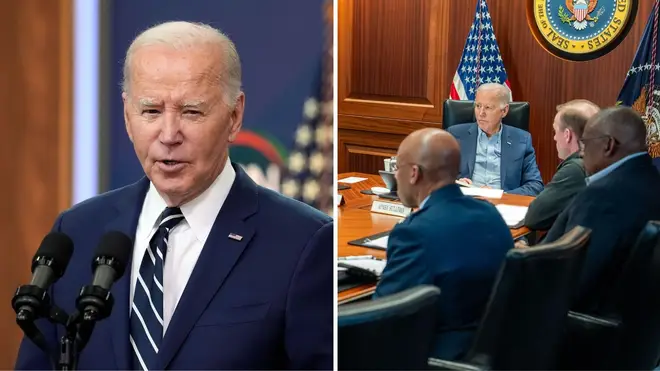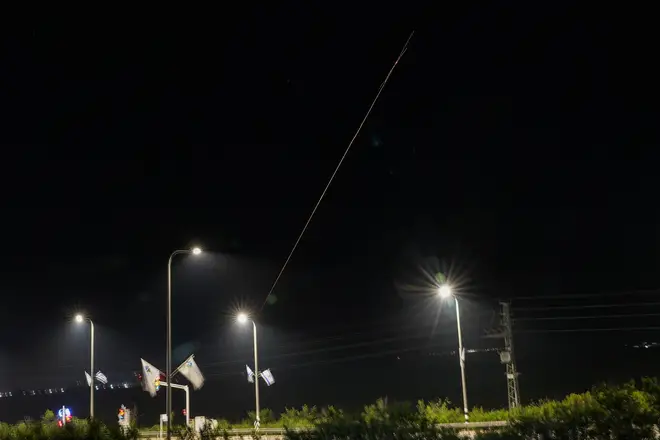
Nick Abbot 10pm - 1am
14 April 2024, 08:30 | Updated: 14 April 2024, 09:44

Joe Biden has reaffirmed the US’s ‘ironclad commitment’ to defending the security of Israel after Iran launched more than 300 drones and missiles on Saturday night.
More than 300 drones and missiles were fired by Iran overnight, 'nearly all' of which were intercepted with the help of the RAF and the US military, an IDF spokesman said.
Following the attack, Mr Biden reaffirmed the US’s defence support of Israel.
He said in a statement: “I’ve just spoken with Prime Minister Netanyahu to reaffirm America’s ironclad commitment to the security of Israel.
“I told him that Israel demonstrated a remarkable capacity to defend against and defeat even unprecedented attacks – sending a clear message to its foes that they cannot effectively threaten the security of Israel.”
He also said that he will convene with G7 leaders on Sunday to coordinate a “united diplomatic response to Iran’s brazen attack”.
“While we have not seen attacks on our forces or facilities today, we will remain vigilant to all threats and will not hesitate to take all necessary action to protect our people,” he added.
Read more: President Biden holds high-stakes emergency meeting as Iran launches full-scale attack on Israel

However, Mr Biden reportedly told Mr Netanyahu that the US will not participate in any offensive operation against Iran, CNN reports, as speculation mounts of potential retaliation.
Iran has warned that its response will be “much larger than last night’s if Israel retaliates against Iran”.
Explosions were spotted in the air as Israel's defence systems intercepted Iranian ordinances during the first direct attack since the 1970s on Saturday night.
Air raid sirens were sounded across Israel to warn civilians of the threat from above after the Israel Defense Force (IDF) warned of the incoming assault at 11pm local time (9pm BST).
Israeli military spokesman Rear Admiral Daniel Hagari said that more than 300 weapons had been fired by Iran in the attack, 99% of which were intercepted.
He said few of the missiles reached Israel, after Iran fired 170 drones, more than 30 cruise missiles and more than 120 ballistic missiles.

Ex-Foreign Office Minister says UK will not be 'dragged into' Israel/Iran conflict

He described the country’s interception mission as “a very significant strategic success” but said the situation is still unfolding and aircraft continue to patrol the skies.
“Iran pushed the Middle East towards escalation. We will do whatever is necessary,” he added.
Israel's sophisticated Iron Dome and other defences were seen intercepting drones and missiles during the attack - including parts of the disputed West Bank region.
Rockets fired by Hezbollah militants in Lebanon were also fired into northern Israel during the attack.
An IDF spokesperson earlier confirmed that Israelis are no longer required to stay near bomb shelters - as the military gives the all-clear to civilians.
Israel announced it was reopening its airspace at 7:30am local time on Sunday, alongside Jordan which also closed late Saturday night, according to state TV.
The attack was warned of in recent days since the IDF killed two Iranian generals in an air strike on the regime's consulate in Damascus, Syria on April 1.
The attack was first confirmed on Saturday evening by the IDF - saying that the Shahed drones were expected above Israel "within hours".
It is the first time Iran has ever launched a full-scale military assault on Israel, despite decades of enmity dating back to the country's 1979 Islamic Revolution.
After the confirmation of the incoming attack, Israeli, British and American forces worked to down the weapons in Jordanian and Syrian airspace.